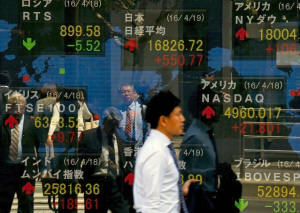|
Brexit fear factor sends stocks spinning
 Send a link to a friend
Send a link to a friend
 [June 13, 2016]
By Patrick Graham [June 13, 2016]
By Patrick Graham
LONDON (Reuters) - Fears Britain is on the
verge of voting to leave the European Union next week coursed through
global financial markets on Monday, sending Asian and European shares
sharply lower and the pound to an eight-week low.
The world economy is looking shaky and weak jobs data suggest even
the United States is not ready for the higher interest rates that
banks say they need to shore up profitability, while concerns that a
vote for Brexit could tip Europe back into recession have lurked in
the background for weeks.
Those concerns came to the fore on Monday, however, as European
shares <.FTEU3> fell 1.5 percent drop and Asian stock markets logged
their biggest falls in four months after a poll late on Friday gave
Britain's "Leave" camp a 10-point lead.
Other polls are tighter, but money markets have now abandoned
expectations, high just weeks ago, that the U.S. Federal Reserve
could raise official borrowing costs on Wednesday, just 8 days
before the UK vote. Instead, the worry is that the Fed could use
language that quells expectations of a move this year at all.
More broadly, after eight years of ultra-low rates and outright
money-printing, investors wonder if central banks have much
ammunition left should the uncertainty that a Brexit would bring for
thousands of businesses weaken demand and investment further.
"We're in uncharted territory in front of the Brexit vote, and then
there's also the Fed this week. So the wall of worry is quite high
at the moment," said Zeg Choudhry, managing director at LONTRAD.
 "All the banks are a little bit lower, and they're the ones which
are likely to get hit. For the next two weeks, you've got to be
slightly mad if you've not got your money in defensive stocks."
The news out of China, global investors' other big concern this
year, was poor, with data showing fixed-asset investment slipped
below 10 percent for the first time since 2000. Stock markets in
Tokyo, Hong Kong and Shanghai all fell by around 3 percent. <.HSI>
<.SSEC>
Moves in Europe, where investors have been preparing for the British
vote for months, were only slightly more subdued. The Frankfurt
<.GDAXI> and Paris <.FCHI> stock exchanges both fell around 1.5
percent.
The index of major European bank shares <.FTMIB>, hammered this year
by concerns over the impact prolonged negative interest rates are
already having on lenders' profitability, fell 2.2 percent.
In contrast, Britain's FTSE 100 <.FTSE> fell just 0.4 percent, and
both Deutsche Bank and JP Morgan said they remained overweight UK
equities into the vote.
"In the case of a 'Leave' vote in the UK referendum ... we expect UK
equities to outperform the European market, given the likely GBP
(British pound) depreciation in such a scenario as well as the
market's defensive sector structure," Deutsche Bank strategists said
in a note.
nd column] |

A man walks past a display of the Nikkei average and other market
indices outside a brokerage in Tokyo, Japan April 19, 2016. Japan's
Nikkei share average soared on Tuesday morning, as a weak yen and a
bounce in oil prices helped the market erase a sharp drop from the
previous day. REUTERS/Thomas Peter

YEN BREAK
On currency markets, sterling fell almost 1 percent against the
dollar <GBP=> after sinking by as much as 3 full cents in value on
Friday. It was down by more, 1.2 percent, at 79.86 pence per euro.
<EURGBP=>
Options market pricing <EURGBPVOL=> showed expectations for the
biggest swings against the euro on record, and analysts at UBS
raised the prospect of a cut in British interest rates and another
round of quantitative easing if the economy struggles after the
referendum.
"If activity does slow further beyond the end of the second
quarter, the market is likely to rapidly start considering how (the
Bank of England) may choose to enact any further easing," economists
from the Swiss group said in a note.
The Bank of England meets on Thursday. [BOE]
Traditionally investors' first choice in times of financial and
economic stress, the yen climbed 1 percent against both the dollar
and euro. <JPY=> <EURJPY=>
Those gains took the Japanese currency past long-term resistance
around 106.50 yen per dollar and put more pressure on the Bank of
Japan to act against the currency's 14 percent rise this year when
it ends a regular meeting on Thursday.
"While the pound is the worst-performing G10 currency versus the
dollar this year, the yen is by far the best," said Derek Halpenny,
European Head of Global Markets Research at Bank of Tokyo-Mitsubishi
in London.
"The continued surge of the yen will lift expectations that the BOJ
may surprise the markets and announce some additional monetary
easing."
(Additional reporting by Alistair Smout in London; Editing by Hugh
Lawson)
[© 2016 Thomson Reuters. All rights
reserved.]
Copyright 2016 Reuters. All rights reserved. This material may not be published,
broadcast, rewritten or redistributed.
 |